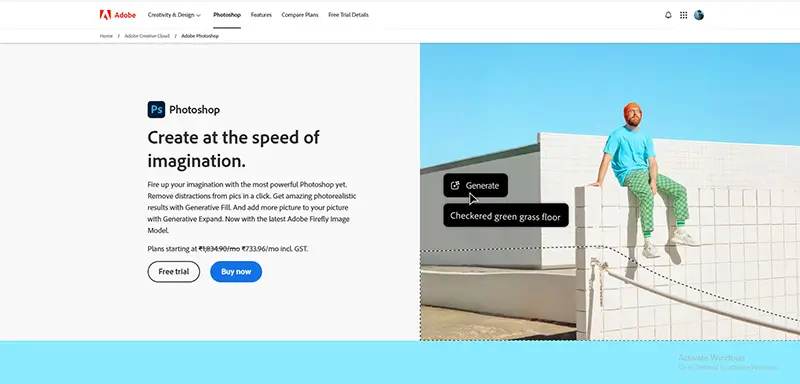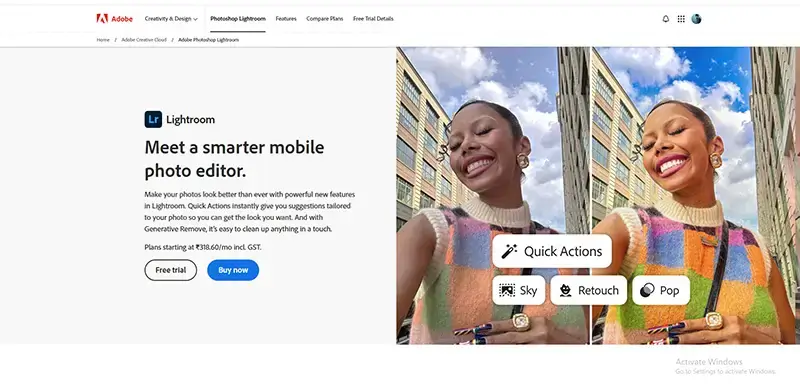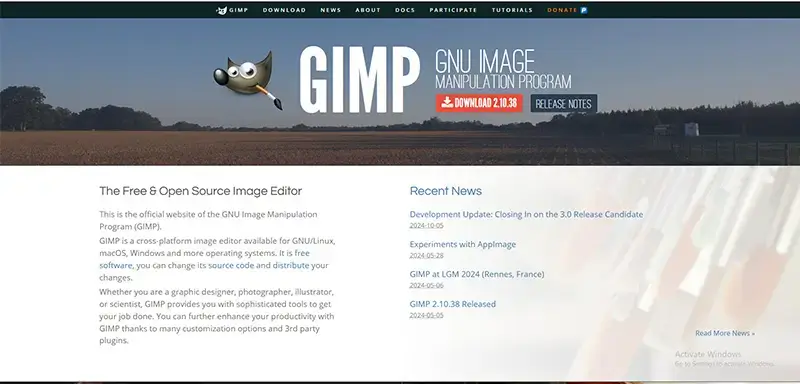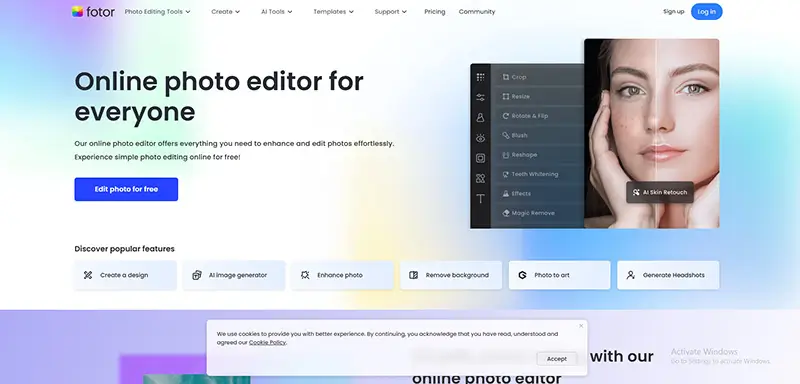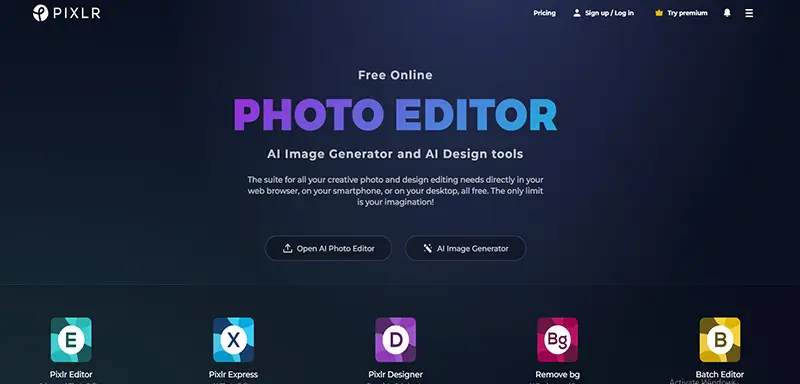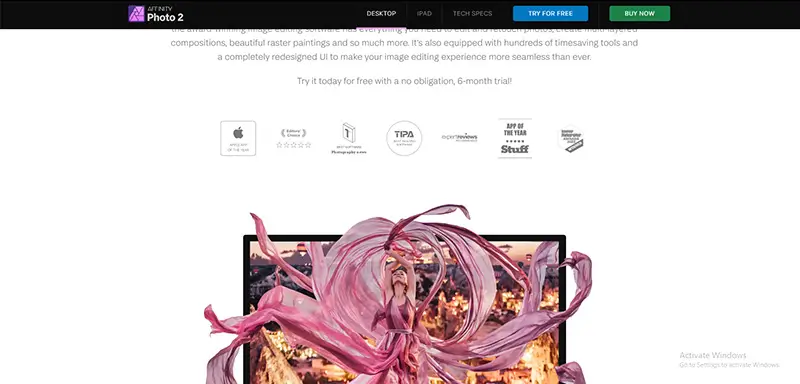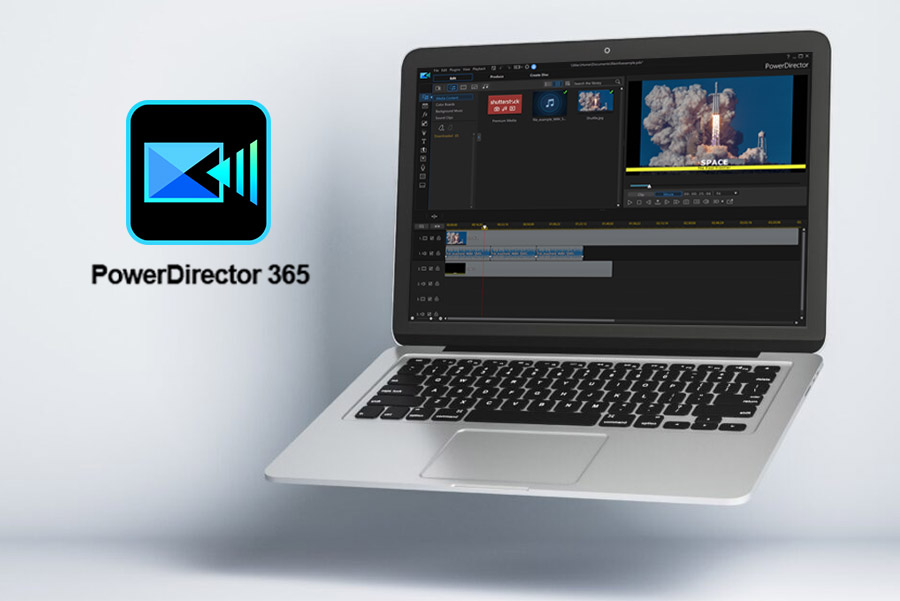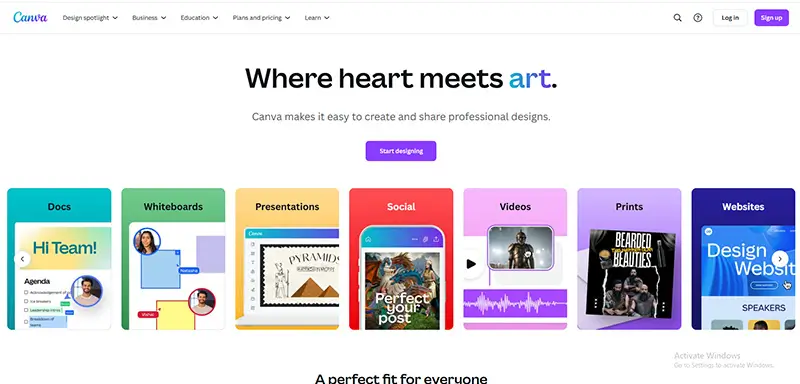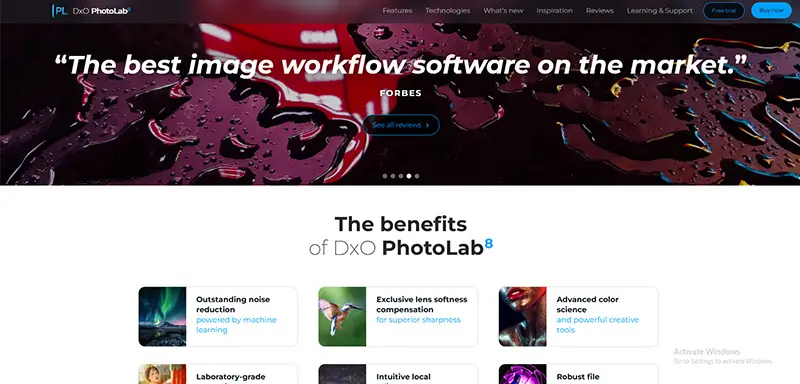
Photo editing has the power to transform an ordinary photographs into something extraordinary that grabs people’s attention. It’s like painting with light and color, bringing out the hidden stories in each image. Whether you are a beginner photographer or a pro, having the right photo editing software can significantly enhance your images.
And we know that every artist needs the right tools. However, in the current market, there are tons of photo editors, making it overwhelming to choose the best one. That is why we have curated this guide and explore the 10 best photo editing software for Windows and Mac, including both free and paid options.
10 Best Photo Editing Software at a Glance
| Photo editing software | Top feature | Pricing | OS compatibility |
|---|---|---|---|
| Adobe Photoshop | Advanced photo manipulation |
Free trial INR 733.96 per month |
Windows, Mac |
| Adobe Lightroom | Photo organization and editing |
Free trial INR 318.60 per month |
Windows, Mac |
| Gimp | Powerful, open-source photo editor | Free | Windows, Mac, Linux |
| Corel PaintShop Pro | User-friendly interface, powerful tools |
Free trial INR 8,599 one-time payment |
Windows |
| Fotor | Collage templates |
Free trial INR 83.25 and 191.58 per month |
Windows, Mac, Web |
| Pixlr | Beginner-friendly |
7 day free trial INR 167.33, 671.85, and 1,092.28 per month |
Windows, Mac, Web |
| Affinity Photo | Professional-grade photo editing |
Free trial INR 5,599.00 one-time payment |
Windows, Mac |
| CyberLink PhotoDirector 365 | AI-powered photo editing |
Free trial INR 3,362.61 per year |
Windows, Mac |
| Canva | Template-based editing |
Free trial INR 500 per month |
Windows, Mac, Web |
| DxO PhotoLab 8 | Raw photo processing and noise reduction |
Free trial NR 19,255.77 one-time payment |
Windows, Mac |
-
Adobe Photoshop

Adobe Photoshop is the go-to for all things creative—whether you’re editing photos or creating digital art, making it the best photo editing software for PC. It’s known for its powerful tools like layers, masking, and a huge selection of brushes. It offers a vast array of tools for everything from basic adjustments to complex manipulations.
A few of its coolest features include Content-Aware Fill (for removing objects seamlessly) and Neural Filters, which are powered by AI and can do things like change expressions or colorize old photos. Plus, Adobe’s Sensei AI makes tasks like sky replacement and selecting complex objects super easy.
Pros:
- Extensive range of tools and features
- Powerful layer-based editing
- Super versatile, perfect for photography, art, and design.
- Loads of plugins and add-ons available
Cons:
- Can be a little difficult to use for beginners
- Only available as a subscription, so there’s a recurring cost
-
Adobe Lightroom

Next in our list is Adobe Lightroom, which is a powerful tool for organizing, editing, and sharing your photos. This paid photo editing software is all about making photo editing easy and organized, especially for photographers with lots of files. Its non-destructive editing means you can experiment without messing up the original image.
Lightroom's user-friendly interface and efficient workflow make it a popular choice for photographers of all levels. It’s a powerhouse when it comes to RAW files, giving you precise control over colors and exposure. And if you like working across devices, Lightroom’s cloud syncing makes it easy to edit on your phone, tablet, or desktop.
Pros:
- Excellent for photo organization and management
- Powerful raw photo processing capabilities
- Non-destructive editing
- Presets make it easy to get professional color grading fast
- Mobile app
Cons:
- Doesn’t have pixel-level editing like Photoshop.
- Requires a subscription for full access
-
Gimp

GIMP, or GNU Image Manipulation Program, is a free and open-source photo editor that rivals many commercial options. If you’re looking for a Photoshop alternative that’s both free and powerful, GIMP is a great choice for Mac, Windows, and Linux. It’s open-source, meaning you can customize it as much as you want.
While its interface may be less intuitive than some commercial software, GIMP’s powerful techniques and customization options make it a favorite among many. GIMP offers tons of advanced tools like layer masks, gradients, and blending, and even supports Photoshop plugins. You can also script tasks if you’re into automating your work, thanks to its support for Python and other coding languages.
Pros:
- Free and open-source software
- Versatile toolset for various photo editing tasks
- Customizable interface
- Plugins are available to extend features
Cons:
- Limited support for super high-color spaces
- Certain features are a bit clunky compared to paid software
-
Corel PaintShop Pro

Corel PaintShop Pro is an all-rounder tool that’s great for photo editing and a bit of graphic design. It is one of the best user-friendly software that offers a powerful set of tools for both beginners and professionals. Its intuitive interface and AI-powered features make it easy to edit photos quickly and efficiently.
One cool feature is SmartClone, which helps you seamlessly combine parts of different photos. It’s got a lot of AI tools, too, like background replacement and artifact removal, so beginners can dive in without feeling overwhelmed. It’s a great choice if you want both photography and design tools in one place.
Pros:
- User-friendly interface
- Affordable one-time payment
- Non-destructive editing
- AI-powered features for quick edits
Cons:
- Only available on Windows
- Not the best choice for editing large files
-
Fotor

Here comes Fotor—an easy, user-friendly photo editing app that’s ideal for quick edits, collages, and fun projects. If you are a beginner or just want to edit photos casually, there is no better option than Fotor. It has a simple and intuitive interface and comes with pre-made templates.
The batch processing feature is a big help if you’re working on multiple photos at once, allowing you to apply edits across the board. Fotor’s one-click effects and filters make it super beginner-friendly, so it’s great if you’re looking to enhance photos without the hassle.
Pros:
- Beginner-friendly
- Easy to use
- Comes with batch processing feature
- Offers a variety of filters, effects, and templates
Cons:
- Lack of advanced editing features
-
Pixlr

Pixlr is another free photo editor online that offers a variety of tools for basic and advanced editing. It's a great option for quick edits and simple adjustments. While it lacks some of the advanced features of other software, its simplicity and accessibility make it a popular choice.
It’s split into Pixlr X (basic) and Pixlr E (advanced), so you can choose based on what you need. The best part? Its AI tools, like the background remover, make it simple to get complex edits done in no time. If you’re on the go or don’t want to download software, Pixlr is a solid choice for tweaks and social media graphics.
Pros:
- Simple and intuitive interface
- Free online photo editor
- Offers cross-platform support
- Plenty of AI effects and filters
Cons:
- Only available online
- Some features are available in only premium plan
-
Affinity Photo

Affinity Photo is a powerful software that rivals Adobe Photoshop in terms of features and capabilities. It offers professional-grade editing without the subscription fees, making it a fantastic one-time investment. It offers a non-destructive editing workflow, a wide range of adjustment tools, and advanced layer-based editing.
It’s optimized for performance, so it can handle large files and heavy edits easily. Unique tools like inpainting (for removing unwanted parts of an image), HDR merging, and panorama stitching make it especially handy. You also get vector tools, so it’s a go-to for both photo and vector editing.
Pros:
- Comes with a professional-grade feature set
- Non-destructive editing
- User-friendly interface
- Good for editing even large, high-resolution photos
Cons:
- There is no built-in cloud storage
- Lacks design templates
-
CyberLink PhotoDirector 365

CyberLink PhotoDirector 365 is a powerful software that uses AI to automate many tasks, simplifying photo editing. It also offers a range of advanced editing tools for fine-tuning your images. You can deblur images, remove objects, replace backgrounds, and retouch faces with just a few clicks.
In addition to that, it has a unique motion-stills tool, which is perfect for creating social media-ready animations. PhotoDirector’s subscription includes regular updates, so you’re always getting new tools to play with.
Pros:
- AI-powered editing tools
- Fast and efficient performance
- User-friendly interface
- Fun features for animated effects and video-to-photo editing
Cons:
- Some features require a subscription
- Limited graphic design tools
-
Canva

Canva is a design-focused tool, and it is easy for anyone to use, even if you’re new to design, making it the best for beginners. Even though Canva is primarily a design tool, it offers a good range of editing tools for resizing, cropping, and adding effects. Also, there are plenty of filters, effects, and text overlay features.
Canva really shines with its templates and design assets, making it ideal for creating eye-catching social media graphics, marketing materials, and more. It's a great option for creating social media graphics, presentations, and other visual content. If you’re after simple edits and quick designs, Canva is hard to beat.
Pros:
- Drag-and-drop interface
- Beginner-friendly
- Offers a wide range of templates and stock photos
Cons:
- Lacks high-end photo editing features
- Some features, templates, and graphics are available in Pro plan only
-
DxO PhotoLab 8

Another best photo editor software is DxO PhotoLab 8, which is a powerful raw photo processing software, making it popular among professionals who need high-quality results. It excels at noise reduction, lens correction, and color rendering.
Features like DeepPRIME noise reduction and ClearView Plus (for boosting contrast without oversaturation) make it a favorite for landscape and detailed shots. DxO’s U Point technology is also unique, as it allows you to make selective edits without complicated masking. It's a great choice for photographers who shoot in RAW format and want to get the most out of their images.
Pros:
- Top-notch RAW processing
- AI noise reduction tool
- User-friendly interface
- Good for selective edits
Cons:
- A little expensive
- Doesn't have enough tools compared to other top-notch editors
Conclusion
So there you have it—the list of the best photo editing software free and paid tools. Finding the perfect editor isn’t as hard as it seems. Whether you need professional photo editing tools, easy filters, or somewhere in between, there’s an option on this list for you. Each software has something unique to offer, and exploring them can even be part of the fun.
Still unsure which software will give you the look you want? Sometimes, it’s easier to leave it to the best photo editing companies! At MAPSystems, our professional photo editors can handle everything from basic retouching to complex edits—saving you time and giving you picture-perfect results. Contact MAPSystems for professional photo editing services!

